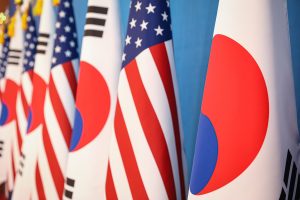One of South Korea’s biggest annual international conferences, the Asian Leadership Conference, was held in Seoul from July 13 to 14. Since its inception in 2005 by the Chosun Ilbo, the oldest and the largest newspaper in South Korea, many prominent world leaders have spoken at the conference, including Barack Obama, George W. Bush, and Henry Kissinger. The theme of 2022 Asian Leadership Conference (ALC) was “Embracing the New Normal: A Proposal for the Future” and covered various topics such as metaverse, AI, women’s leadership, energy, entrepreneurship, ESG, press freedom, and more.
Leaders who participated in this year’s ALC agreed on the challenges the world faces today: uncertainty and hardship derived from COVID-19, the Ukraine war, inflation, and supply chain disruption. President Yoon Suk-yeol said at the opening ceremony of the conference that these challenges can only be solved with strong solidarity among the nations of the international community. He confirmed again that South Korea, as a global leader, would play a leadership role in addressing these shared challenges.
Emphasizing that the country has core competences in cutting edge industries like semiconductors and batteries, Yoon stated that South Korea would work to create mutually beneficial supply chains and promote international cooperation to reinforce technology and industry partnerships. He promised to help the private sector become the principal actor in efforts to achieve this task.
Economic security has become a buzzword these days. When then-U.S. President Donald Trump said, “For the first time, American strategy recognizes that economic security is national security” in December 2017, it represented a sea change in U.S. views about the national security threats created by unrestrained free trade. As the Trump administration’s new approach to trade became clear, fears were raised that it would lead to a series of trade wars – not just with a competitor like China, but also with allies like Japan, South Korea, and the European Union. The Biden administration has begun to allay such concerns by taking a more balanced approach.
Concepts of “economic security” are still being formed and views may differ. How far the United States goes in establishing a full-fledged industrial policy remains to be seen. The recently passed CHIPS and Science Act of 2022, which aims to establish advanced semiconductor manufacturing capacity in the United States, represents a traditional approach to industrial policy that seeks to onshore the manufacturing of a strategic product through direct state subsidies to private corporations. At the same time the Biden administration is also pursuing a policy of securing supply chains through what has become known as “friend-shoring.” Friend-shoring is based on the simple idea that economic security can most efficiently be obtained through the cooperation and collaboration of like-minded countries with shared values and interests.
The commitment of the Biden administration to friend-shoring as well the traditional U.S. preference of working through private sector stakeholders was well reflected in President Joe Biden’s individual meetings with heads of South Korean conglomerates like Samsung, Hyundai Motors, and SK. Until very recently, U.S. presidents’ visits to South Korea were mostly filled with meetings with government officials plus potential public events, like a speech at a university. It was unimaginable that a U.S. president would set time aside for an individual meeting with a private company from South Korea. Biden, however, has had a series of such meetings.
The very first item on Biden’s official schedule during his first visit to South Korea as U.S. president in May was a visit to Samsung Electronics Pyeongtaek campus. During his very short time in South Korea, Biden also separately met Hyundai Motors Chairman Chung Eui-sun and thanked him for Hyundai’s investment in Savannah, Georgia.
On July 27, while working from a secluded area after being diagnosed with COVID-19, Biden had an exclusive virtual meeting with SK Chairman Chey Tae-won, who promised new investments in the United States that would create U.S. jobs in the semiconductor industry, EV batteries, and biotechnology. Regretting that he couldn’t have an in-person meeting as originally planned, Biden had Chey visit the White House Rose Garden and said “thank you” almost 10 times while waving his hand from the balcony like a scene from Romeo and Juliet.
In the end, all these measures require direct state interventions in the economy that would have been unthinkable 10 years ago in the United States. The fact that these steps are now considered necessary and inevitable reflects a breakdown in the post-Cold War globalized international order and the resulting return of great power politics.
The China-U.S. rivalry necessitated this kind of close coordination by both the U.S. and South Korean governments with private corporations. Mike Pompeo, a former U.S. secretary of state, insisted during his remarks at the ALC that an economic alliance between the U.S. and South Korea must be built since China’s first tool of coercion and influence operation has been always economic. U.S. Ambassador to Korea Philip Goldberg said at one of the ALC sessions hosted by the Korea Economic Institute of America (KEI) that South Korea will play a pivotal role in the U.S.-led Indo-Pacific Economic Framework (IPEF) as a founding member. The IPEF is reportedly aimed at reducing the role of China in global supply chain.
The U.S. and South Korea will celebrate the 70th anniversary of their alliance next year. The two countries have been working to expand and deepen the relationship into new areas. In the past, the United States and South Korea have always found a way to accommodate each other’s shifting and evolving interests to take the alliance to the next level. The China-U.S. rivalry will test the alliance as never before, but the ties being forged today that bind the two countries’ economic fortunes together will not be broken easily.
































